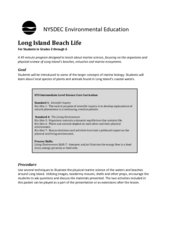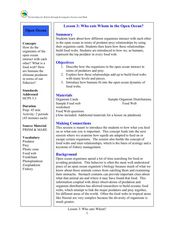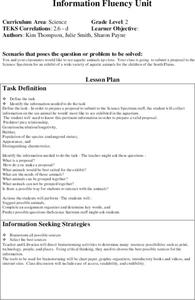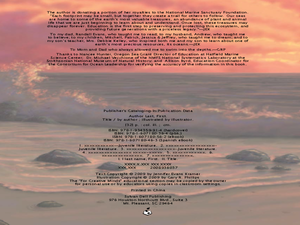Curated OER
Long Island Beach Life
Have your class learn about marine life through this resource. This comprehensive lesson has learners discuss marine life, learn key vocabulary, discuss environmental concerns, and play games related to migration and predator/prey...
NOAA
Understanding Food Chains and Food Webs
Jump into an exploration of marine ecosystems with the first lesson in this four-part series. After first learning about crustaceans, mollusks, and other forms of sea life, young marine biologists view a PowerPoint presentation that...
NOAA
An Ocean of Energy
Young biologists trace the path of the sun's energy through marine ecosystems in the second part of this four-lesson series. Building on prior knowledge about producers, consumers, and decomposers young scholars are introduced to the...
Nature Works Everywhere
Sharks and Shorelines
Examine predator-prey marine relationships through an interactive lesson design. Learners begin by studying a specific shark species and then analyze real-time shark-tracking data. They also study threats to shark populations and...
Curated OER
Specialized for the Sea
Students use pictures and make a mural to investigate how ocean animals are adapted to certain parts of their environment.
Curated OER
Predator/Prey Activity: Fish Feeding, Environments, and General Behavior
Students explore concepts of environment and survival among different marine life, focusing on the ocean environment.
Curated OER
Sound for Sight
Young scholars study echolocation and understand how dolphins use it to locate prey, escape predators, and navigate their environment. They view a video, "In the Wild-Dolphins with Robin Williams" and see first hand how dolphins...
Curated OER
Wildlife
First, biology pupils research land and marine habitats along the route of skipper Rich Wilson's Great American II. Then, using colored paper clips scattered across a colored paper background, they play the predator-prey game to...
ARKive
Dinner at the Reef
Fine dining can happen anywhere, even in the coral reefs. Budding environmentalists explore marine food chains, predator-prey relationships and the importance of a balanced ecosystem. These important concepts are facilitated through a...
Curated OER
Life in the Kelp Forest
Students research and create a marine food web to learn about plants and animals in a kelp forest. In this marine food web lesson plan, students draw lines between kelp forest predators and prey and show the flow of energy in the food...
Curated OER
Camouflage, Protection, & Adaptations—Who am I?
Students explore ocean animal adaptations. In this animal adaptations lesson, students examine how different ocean animals use adaptations other than camouflage to protect themselves.
Curated OER
Saved by a Shark
Students explore the marine ecosystem and the importance of sharks. For this shark lesson, students look at photos of the Flower Garden Banks National Marine Sanctuary and discuss the animals that live there. They discuss which animals...
Florida International University
The Good, the Bad and the Nasty Tasting
Examine the benefits of chemical defense mechanisms. Organisms in oceans use chemicals to ward off predators. Duplicate this adaptation using a hands-on experiment in which you ward off your predators (your pupils) with some bad-tasting...
Curated OER
Schooling Fish
Students make fish models. In this fish behavior instructional activity, students create lanternfish fishsticks, learn how a school of fish live, eat and swim together, examine the predator-prey relationship, and read the book Swimmy to...
Curated OER
Blue Planet: Seas of Life - Tidal Seas
After viewing the video Blue Planet: Seas of Life, students review oceanic concepts. In this earth science activity, students reflect on the effect tides have on living things and conduct research to create a "tidal trivia" game....
Curated OER
Predators Among Us
Students study environmental science. In this ecosystems lesson, students discover how humans have an impact on life in the coral reef. They watch video clips and work on small group activities. This lesson includes links to the videos...
Curated OER
Seas Of Life
Students brainstorm examples of predator and prey that are featured in a video they watch. In this investigative lesson students will research an animal from the video and explain if it is a predator or prey and how it helps species...
Curated OER
Who Eats Whom in the Open Ocean?
Students examine how organisms interact with one another in the ocean. For this science lesson, students discuss predators and prey in the ocean. Students discuss food webs and how organisms interact with each other.
Curated OER
Information Fluency Unit
Second graders create a proposal for the Science Spectrum to have an exhibit of a wide variety of aquatic animals for the children of the South Plains. These students would like to see aquatic animals up close.
Curated OER
Organize Ocean Animal Research
Sixth graders research a variety of ocean animals, organizing the facts in the form of a database. They input the results of the research into the appropriate field of their database for their Oceanography Science Unit.
Curated OER
the Journey of the Pacific Salmon in the Open Ocean and Fishing
Third graders discuss salmon and their life cycle. In this salmon life cycle lesson, 3rd graders recognize the difficulties researching the life cycle of salmon as they migrate. Students conduct an experiment and create a game.
Curated OER
Underwater Hide and Seek
High schoolers explain why color patterns that are easy to see above water may be difficult to detect under water and experience the problems predators face when searching for camouflaged prey.
Curated OER
Kure Waste Chase Game Lesson
Students work together to identify marine debris. They explain the effect of the debris on various ecosystems. They draw different types of ocean currents as well.
Curated OER
Animal Hide and Seek
Students read about animal camouflage. In this animal adaptation lesson, students read short texts about ways in which animals hide or transform to escape their prey. Students explore animal classifications and determine ways to hide in...

























